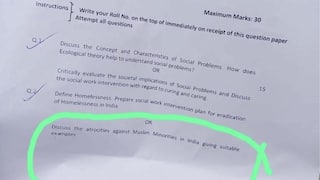World Arthritis Day 2023: What Is Rheumatoid Arthritis? All You Need To Know About It
Rheumatoid Arthritis (RA) is a persistent autoimmune ailment that inflicts significant damage on joints, leading to discomfort, inflammation, and structural harm.

Rheumatoid arthritis (RA) is a chronic autoimmune disease characterized by joint inflammation, pain, swelling, and deformities. In this condition, the body's immune system mistakenly identifies healthy joint tissue as a foreign invader and launches an attack on it, leading to damage.
Talking about this, Dr Usha Chennuru, who is the Director - Medical Services, at Cipla Health Ltd. said, "Rheumatoid Arthritis (RA) is a persistent autoimmune ailment that inflicts significant damage on joints, leading to discomfort, inflammation, and structural harm. It represents a relatively prevalent form of arthritis, affecting approximately 1% of the global population. While the precise etiology of RA remains uncertain, it is thought to result from a complex interplay of factors, encompassing genetic predisposition and environmental influences."
"Some individuals may inherit genetic traits that heighten their vulnerability to Rheumatoid Arthritis. Yet, the onset of the condition often necessitates exposure to environmental triggers, such as smoking, infections, or specific chemicals."
Risk Factors Of Rheumatoid Arthritis:
Dr Usha Chennuru listed down the following risk factors of Rheumatoid Arthritis:
- A family history of RA serves as a compelling indicator of susceptibility, notably with a higher prevalence among women.
- Age also emerges as a significant factor, with the risk escalating as individuals age.
- Smoking, in particular, stands out as a notorious risk factor, not only in terms of potentially triggering RA but also in exacerbating its severity.
- Additionally, excess body weight can compound the effects of RA, as it places added strain on the affected joints.
Speaking in terms of Ayurbeda, Dr. Pranit Ambulkar, who is the Head R&D- Health & Wellness, at Netsurf Communications Pvt. Ltd. said, "Ayurveda, an ancient Indian system of medicine, offers valuable insights into the risk factors associated with this condition. According to Ayurveda, individuals who regularly consume food items that are incompatible with their body constitution, health, weather, and profile are at a higher risk. Other risk factors include weak digestion, a sedentary lifestyle, and exercising immediately after consuming fatty foods."
"Ayurveda identifies a key factor in RA as the accumulation of incompletely digested metabolites referred to as 'Aama.' When Aama escapes its designated pathway and enters the general circulation, it can attach to various body tissues, including joints. The immune system attempts to neutralize this toxin, resulting in an inflammatory response and damage to the healthy joint tissue. In Ayurveda, this condition is known as Aama vata," he added.
Diagnosis Of Rheumatoid Arthritis:
To diagnose RA, medical professionals typically delve into a patient’s medical history, perform physical examinations, and conduct blood tests to detect specific markers. Imaging procedures like X-rays and MRI scans may also be employed in the diagnostic process.
Dr Usha Chennuru said, "Timely identification of rheumatoid arthritis (RA) and the formulation of personalised treatment strategies are pivotal for the effective management of this condition. Early detection and the provision of appropriate medical care can markedly enhance the quality of life for individuals contending with RA. Moreover, it is essential to underscore the significance of lifestyle adjustments, including maintaining a healthy weight and abstaining from smoking, as these measures can mitigate the likelihood of developing this debilitating ailment."
Treatment And Prevention Of Rheumatoid Arthritis:
- Medications: Medications are a cornerstone of RA treatment. Disease-modifying antirheumatic drugs (DMARDs) can help control inflammation and slow the progression of joint damage. Early intervention with these medications is crucial to achieve the best outcomes.
- Pain Management: Pain and inflammation are hallmarks of RA. Pain relievers like nonsteroidal anti-inflammatory drugs (NSAIDs) and analgesics can provide relief. However, they should be used under medical supervision due to potential side effects.
- Physical Therapy: Physical therapy plays a vital role in RA management. It helps improve joint function, maintain mobility, and prevent muscle weakness. Customized exercise programs can be designed to suit the patient's needs.
- Orthopedic Devices: Devices such as splints, braces, or custom orthotics will help to alleviate joint strain and improve function.
- Surgery: In advanced cases of RA where joint damage is severe, surgical interventions may be necessary. Joint replacement surgeries, such as hip or knee replacements, can significantly improve the patient's quality of life.
- Lifestyle Modifications: Lifestyle changes, including maintaining a healthy weight, practicing joint protection techniques, and modifying daily activities, can reduce the strain on affected joints.
- This can be done by eating a balanced, healthy diet. Avoid following any crash diets as they deprive you of necessary nutrition. Eat a healthy diet. A healthy diet can help reduce inflammation and improve overall health. Make sure to eat plenty of fruits, vegetables, nuts and whole grains. Avoid high-salt diet. Limit processed foods, sugar-sweetened drinks, and unhealthy fats.More red meat intake can increase the risk of rheumatoid arthritis. More of Omega-3 fatty acids in diet including fish may help reduce the risk of rheumatoid arthritis. Vegetarian sources of omega-3 are nuts, chia seeds and flax seeds.
- Aim for at least 30 minutes of moderate-intensity exercise like walking, swimming, cycling for five days of the week. Exercise will also reduce your risk of developing many other chronic health conditions.
- Smoking is a major risk factor for RA. If you smoke, quitting is one of the best things you can do to reduce your risk of developing the disease. Avoid smoking around children.
- Certain occupations are associated with increased risk for this disease by their exposure to organic or inorganic inhalants. For e.g. inhalation of pesticides in farmers, coal dust in miners, textile dusts and silica dust. If possible, avoid exposure to these environmental triggers.
- Setting your office ergonomically can prevent sore joints. Back ,leg and arms to be well supported. Take regular breaks while working for long hours and go for walk.
- Periodontal disease is a chronic inflammation of the gums. Some studies have found an association between chronic periodontitis and rheumatoid arthritis. Good oral hygiene and regular dental check-ups can help prevent periodontal disease.
- One needs to maintain their calcium and Vitamin D levels in healthy range. • See your doctor regularly. Your doctor can help you manage your risk factors for RA and identify any early signs of the disease. The major joint damage occurs within two years of disease onset, and you will have good results, if your diagnosis and treatment begin within six months of your first symptom.
[Disclaimer: The information provided in the article, including treatment suggestions shared by doctors, is intended for general informational purposes only. It is not a substitute for professional medical advice, diagnosis, or treatment. Always seek the advice of your physician or other qualified healthcare provider with any questions you may have regarding a medical condition.]
Check out below Health Tools-
Calculate Your Body Mass Index ( BMI )






































